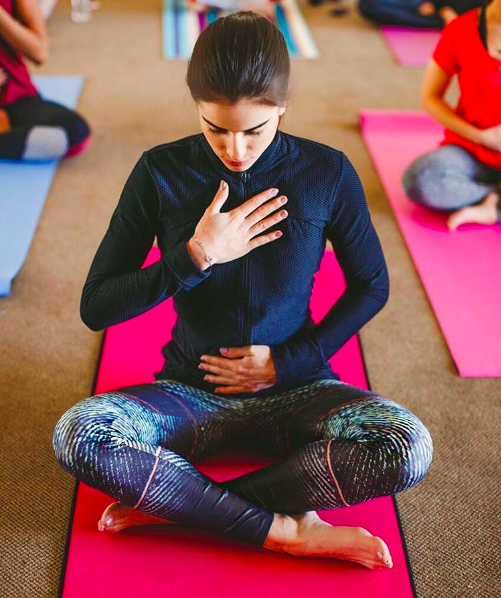I started practicing yoga around the same time I began to really pay attention to my diet and focus on plant-based living. I came to the vegan lifestyle from the newly trendy “detox” perspective. Convinced that my body was overburdened by toxins (and given the state of my acne-ridden skin, it may have been!), I was constantly looking for ways to live “cleaner.” Unfortunately, this didn’t make me feel particularly good about myself.

The idea that I was somehow impure was confirmed by the little reading I did about traditional yoga practices. One text dictated that yogis should bath before yoga; meanwhile, yoga itself would cleanse our bodies of toxins and cleanse our minds of negative thoughts. This idea is nice, but it comes with a biting assumption: we’re inherently tainted, and we need an external factor (like yoga) to rid us of our uncleanliness. In some cases, modern yoga isn’t much better. We often hear that this or that pose is particularly suited to detoxification (namely, twists) and that we need yoga to experience a higher plane of living.
Although there is a general truth to some of the cleansing claims surrounding both ancient and modern yoga—exercise supports healthy liver function (and the body’s natural detoxification processes) while also helping us ease the mental and emotional tensions of daily living–I would caution others to avoid becoming overzealous about detoxifying (mind, both, or both—whether that’s through yoga, eating, or lifestyle components).
Because I’m someone who’s already prone to feeling vaguely unworthy and internalizing lifestyle advice as a criticism, I’ve learned to do my best to avoid getting in too deep with the pursuit of purity/detoxification. It’s emotionally dangerous, not to mention counterproductive, to be consumed by the idea that you must constantly, actively detox in one form or another. We’ve also got to ask ourselves: Is is really healthy living if we don’t have a healthy mindset?
This is not to say that we should all abandon short-term cleanses or living a lifestyle that by and large supports the body’s natural detoxification processes. Not at all. Rather, I suggest we be careful about framing certain parts of our lifestyle as a means to an end—i.e., reaching bodily purity—especially for those of us susceptible to “toxin guilt.” Instead, we can actively reframe yoga, eating, and self-care as ends in themselves. We can also shift the ways we think about purity and detoxification.
Don’t worry, you’ll still get their health benefits. The actives will simply be much more enjoyable. And best of all, you may find yourself with better self-esteem and a healthier sense of boundaries.
Here are a few suggestions for rethinking bodily purity—many of them spring from the lessons of yoga.
1. Create a mantra that supports a healthy approach to striving for a healthy lifestyle. This may apply to any aspect of your healthy lifestyle. A few examples: I practice yoga for yoga’s sake and for my sake. Or, I eat well because I love to nourish myself.
2. Redefine “detox” or “purity.” Take out your journal. Write the word “detox” or “purity” at the top of a blank page. Sketch or make a list of positive, realistic associations you have with these often fraught words. For example, instead of associating detox with eating perfectly, I now think of it as a process that makes me feel good inside my skin. (This translates to eating well—not perfectly—but not feeling guilty about the coffee I enjoyed with a friend—or by myself.) When I consider the way yoga “purifies me,” I no longer think about how performing the asanas with absolute grace will somehow bestow me with a body that defies genetics. Instead, I think of how yoga helps soften my stress. Indeed, I leave the practice feeling lighter and, in my own way, purer.
3. Practice self-love through forgiveness. Yoga teaches us that imperfection is okay—and even beautiful. Just think of the all the funky asanas that celebrate asymmetry (bird of paradise comes to mind). Yoga also teaches us that we may not perform or feel the same from day to day. (We’ve all heard the phrase listen to your body, right?) And that’s okay. Likewise, if we’ve lived “impurely” one day—however you define that—we can forgive ourselves. Or, in some cases, we can celebrate our nonlinear, imperfect, challenging, and complex lives.
4. Speaking of celebrating, celebrate your lifestyle successes (even the small ones!) rather than focus on what you did “wrong.” There’s a parallel for this in yoga. We can’t always make it into certain poses. For example, I’ve always struggled getting into boat pose with legs straight. But I don’t worry too much about this because I know the intention is what matters. “Showing up” and practicing boat pose—even if it look like hot mess—is a small success worthy of celebration.
How do you approach healthy living with a healthy mindset?
More in Peaceful Practice: Does Yoga Breathing Oxygenate the Body?
Get more like this–sign up for our newsletter for exclusive inspirational content!
__
Photo: Norah La Pertosa via Instagram




